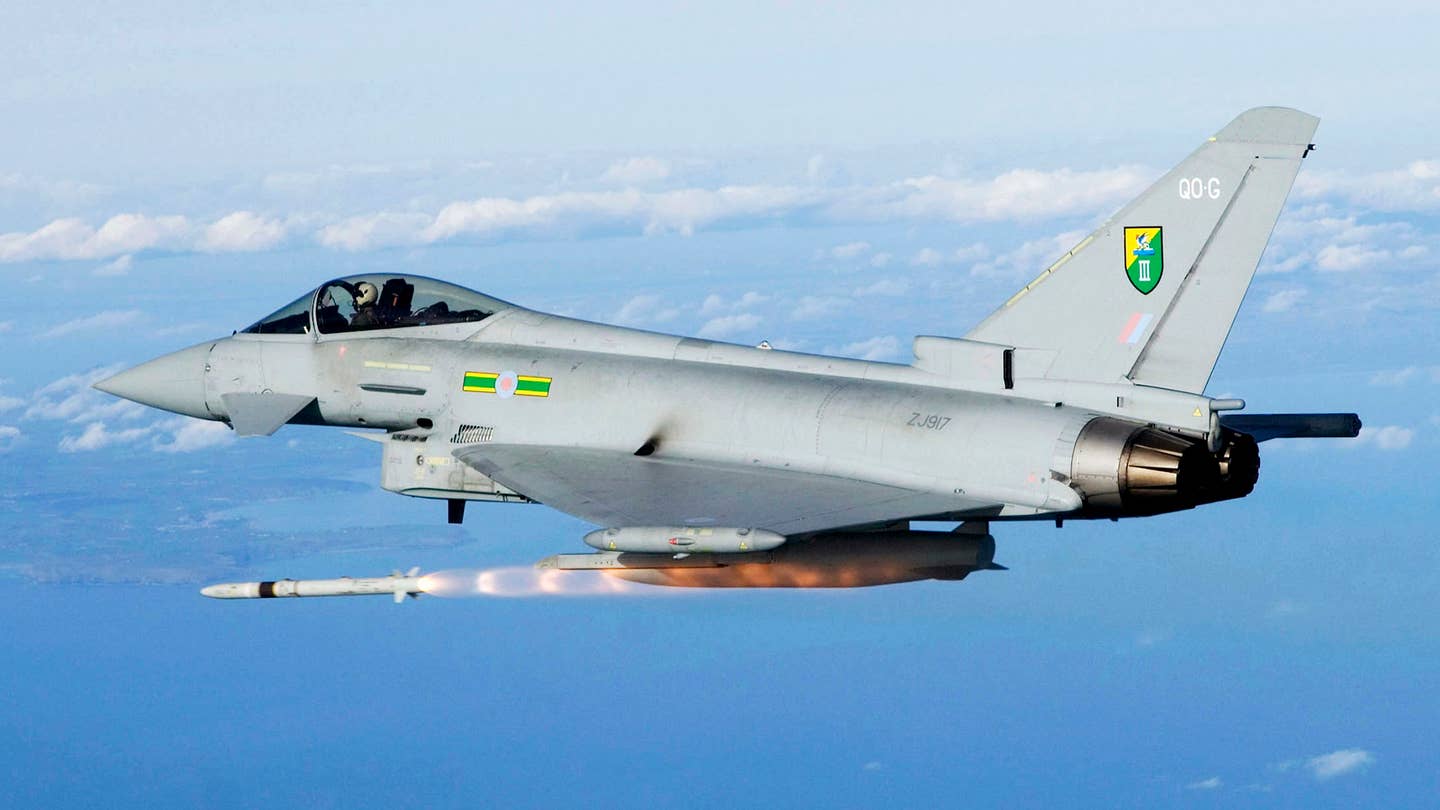Faced with continued delays in acquiring more F-16s, Turkey is now said to be in talks to buy secondhand Eurofighter Typhoons.

Turkey has emerged as the latest possible customer for the Eurofighter Typhoon, in something of a surprise move, as the NATO country seeks to address delays in acquiring another batch of F-16 fighters from the United States. While Ankara is said to be eyeing the purchase of as many as 40 Typhoons, the collaborative nature of that program could see any such deal blocked: Germany, in particular, is expected to resist a sale to Turkey.
A U.K. Royal Air Force Typhoon fighter takes off from RAF Akrotiri, Cyprus. Crown Copyright
Turkey’s defense minister, Yasar Gular, announced today that the country was in talks with Spain and the United Kingdom to buy Typhoons, though Germany was said to have already objected to the idea, Reuters reports. The status of Italy, the fourth of the Eurofighter partner nations, was not made clear.
“We are working on procurement,” Gular said at a parliamentary hearing in Ankara. “Now the United Kingdom and Spain are making efforts to convince Germany, (though) we are not in talks with Germany… If possible, we plan to purchase 40 Eurofighter Typhoon jets.” Some reports suggest those 40 aircraft might be purchased in two batches of 20, should the deal move forward.
While Eurofighter continues to manufacture new-build Typhoons, at least some of the four partner nations, as well as Austria, have made previous efforts to offload their less-capable Tranche 1 versions of the jet. The Tranche 1s have an extremely limited air-to-ground capability, but they would likely be available much more quickly. The deal would also likely be very welcome to Spain and the United Kingdom, who would get these older aircraft off their books and free-up additional funding for modernization.
Again, however, a transfer would require German approval. Turkey could also demand a higher level of capability, including more capable radar, the MBDA Meteor beyond-visual-range air-to-air missile, and advanced air-to-ground munitions.
Citing “Turkish officials familiar with the matter,” the Saudi-based Al Arabiya TV news channel reported that Turkish President Tayyip Erdogan was likely to ask Chancellor Olaf Scholz to lift a block on the sale of Typhoons during his visit to Germany tomorrow.
Reports, however, suggest that Scholz is unlikely to be swayed. While Germany already has a notably strict weapons export policy, the current political climate provides Berlin with additional reasons not to transfer arms to Turkey.
Trucks associated with the S-400 air defense system arrive at Murted Air Base in Turkey, in July 2019. TURKISH MINISTRY OF NATIONAL DEFENSE
Last month, Erdogan told a huge pro-Palestinian rally in Istanbul that he considered Israel an occupier and once again claimed that Hamas is not a terrorist organization.
“The main culprit behind the massacre unfolding in Gaza is the West,” Erdogan told the crowd. “If we leave aside some conscientious voices… the massacre in Gaza is entirely the work of the West.”
Erdogan also said that Israel was behaving like a “war criminal.”
Another factor that could well play against German approval for a Typhoon sale is Turkey’s continued resistance to ratifying Sweden’s membership of NATO. In particular, Ankara has been unhappy with what it alleges is Sweden’s sympathetic stance on Kurdish militants, including members of the Kurdistan Workers Party (PKK), considered a terrorist organization by Turkey, the European Union (EU), and the United States.
Speaking to reporters yesterday, German government spokesman Steffen Hebestreit said of Erdogan’s German trip: “This is a visit by a difficult partner with whom we are discussing a whole range of dossiers.” Hebestreit reiterated the German government’s position that Israel has a right to defend itself following the October 7 attack by Hamas.
With all these complicating factors, why, exactly, is Turkey trying to buy Typhoons at this point?
The immediate need for additional fighters comes as Ankara faces delays in its plans to buy more F-16s.
The Turkish Air Force is already the world’s third-largest F-16 operator, with a total of 270 of these aircraft delivered in successively more capable Block 30, Block 50, and Block 50+ configurations.
Turkey had requested a $20-billion deal for 40 more new F-16s, as well as around 80 modernization kits for existing jets, since October 2021, but the deal was for long held up by Congress amid worsening relations between Ankara and Washington.
Turkish Air Force F-16s. Photo by Ali Atmaca/Anadolu Agency via Getty Images
In July this year there appeared to have been some progress, as we reported at the time, with U.S. National Security Adviser Jake Sullivan confirming that the United States would now seek to approve the Turkish F-16 deal, after consultation with Congress.
Faced with worsening relations with the United States, Turkey had reportedly already begun stockpiling spare parts for its existing F-16 fleet in 2019. As we have discussed in the past, a structural improvement program was also enacted to extend the service lives of some of the oldest Turkish F-16s, and there have also been expanding efforts to introduce locally produced weapons, too.
At the same time, Turkey is looking on as Greece, its primary regional rival, and also a NATO member, introduces French-made Dassault Rafale fighters to its air force. Traditionally, if Greece buys new fighters, Turkey will respond with a fighter buy of its own, to keep pace, with Greece doing the same.
A Hellenic Air Force Rafale. Dassault Aviation
You can read all about the background to long-simmering tensions between Turkey and Greece in this previous report, suffice to say that aircraft from their respective air forces frequently have less-than-friendly encounters over the Aegean, sometimes including dogfights and even combat losses.
There are other reasons, too, why Turkey is looking for new fighters now. The country was sensationally ejected from the F-35 Joint Strike Fighter program, after refusing to abandon plans to buy S-400s from Russia. Ankara had planned to buy at least 100 F-35s. These would have replaced, among others, the Turkish Air Force’s last veteran F-4 Phantom IIs. Although upgraded, these aircraft remain in frontline service and badly need replacement.
The unveiling ceremony for the first F-35A planned for Turkey, in June 2018. ANADOLU AGENCY
Turkey is working on a domestically designed and built fighter of its own, the Turkish Aerospace Industries TF-X, a stealthy aircraft also known as Kaan. However, there remain questions about the feasibility of this project, especially when it comes to sourcing engines and, even if it all goes to plan, it won’t begin to enter service until 2030, at the earliest. Additional advanced and highly ambitious drone programs are also seen as a hopeful capacity enhancement that will take pressure off the country’s aging fighter force, but these projects are still in early flight test. Exactly how they will pan out in terms of relevant capabilities is yet to be seen.
At this point, the chances of Germany approving a Typhoon sale to Turkey appear somewhat limited.
There remains the possibility that Ankara’s interest in the European jet is primarily motivated by a desire to put further pressure on Washington to agree to sell it the F-16s it has long been seeking. After all, the Turkish parliament’s foreign-affairs committee began debating Swedish accession to NATO today. Reports had suggested ratification could come as early as next week, which should finally clear the path for U.S. approval to transfer F-16s to Turkey, although the debate now appears to have stalled, for the time being.
Whatever happens, it’s clear that Turkey needs new fighters to boost its air arm, and it wants them sooner rather than later.
Contact the author: thomas@thedrive.com


